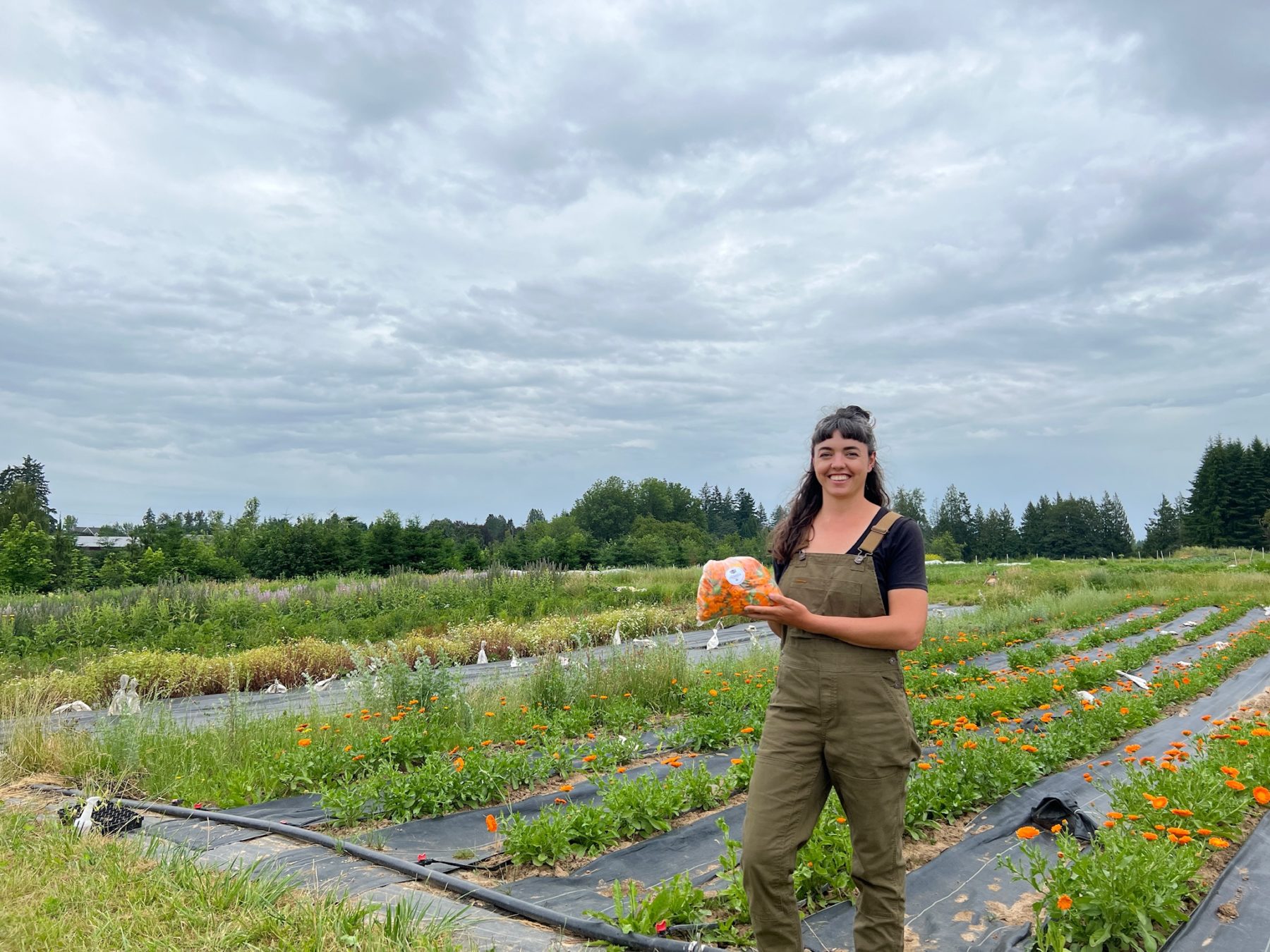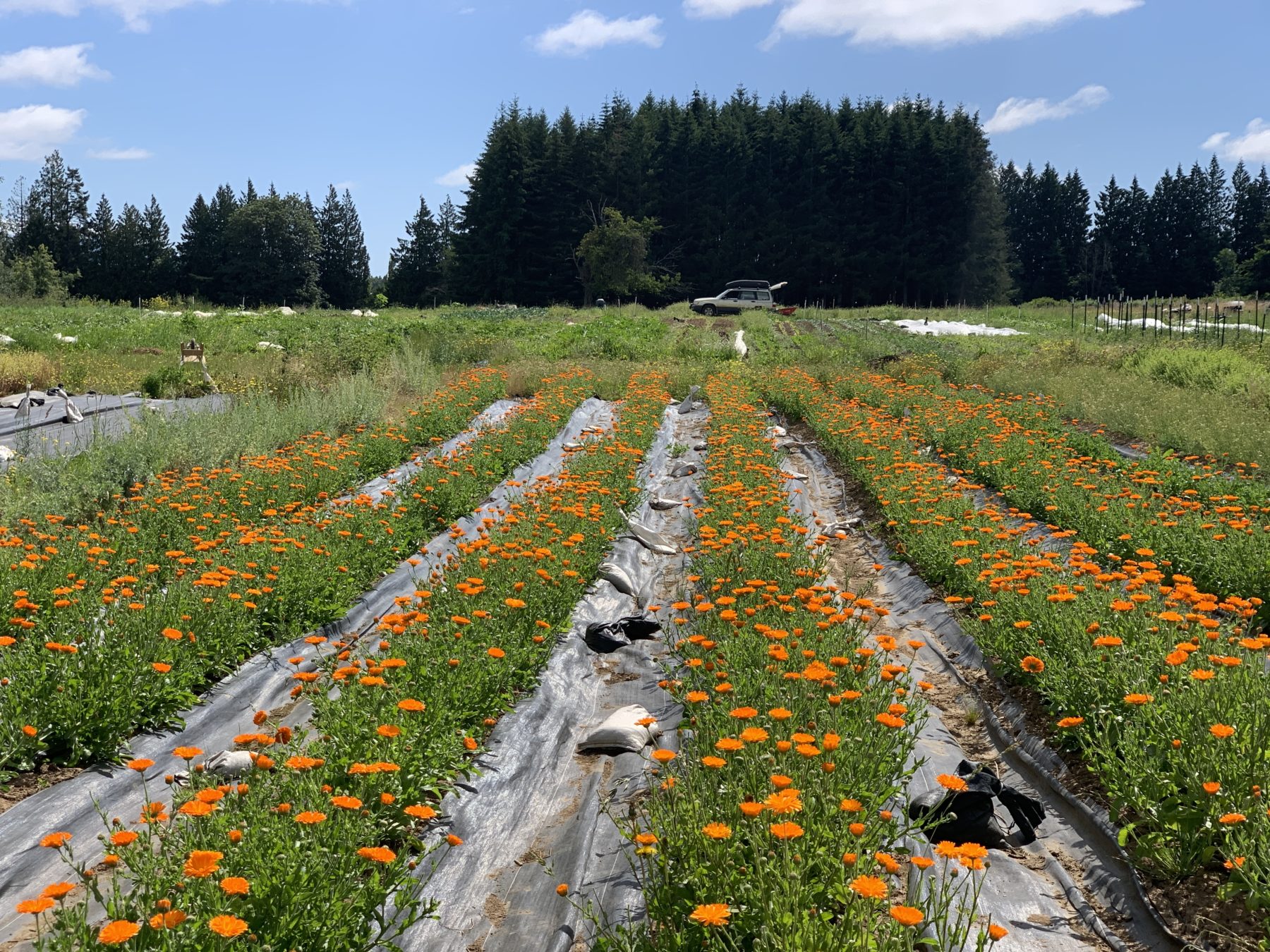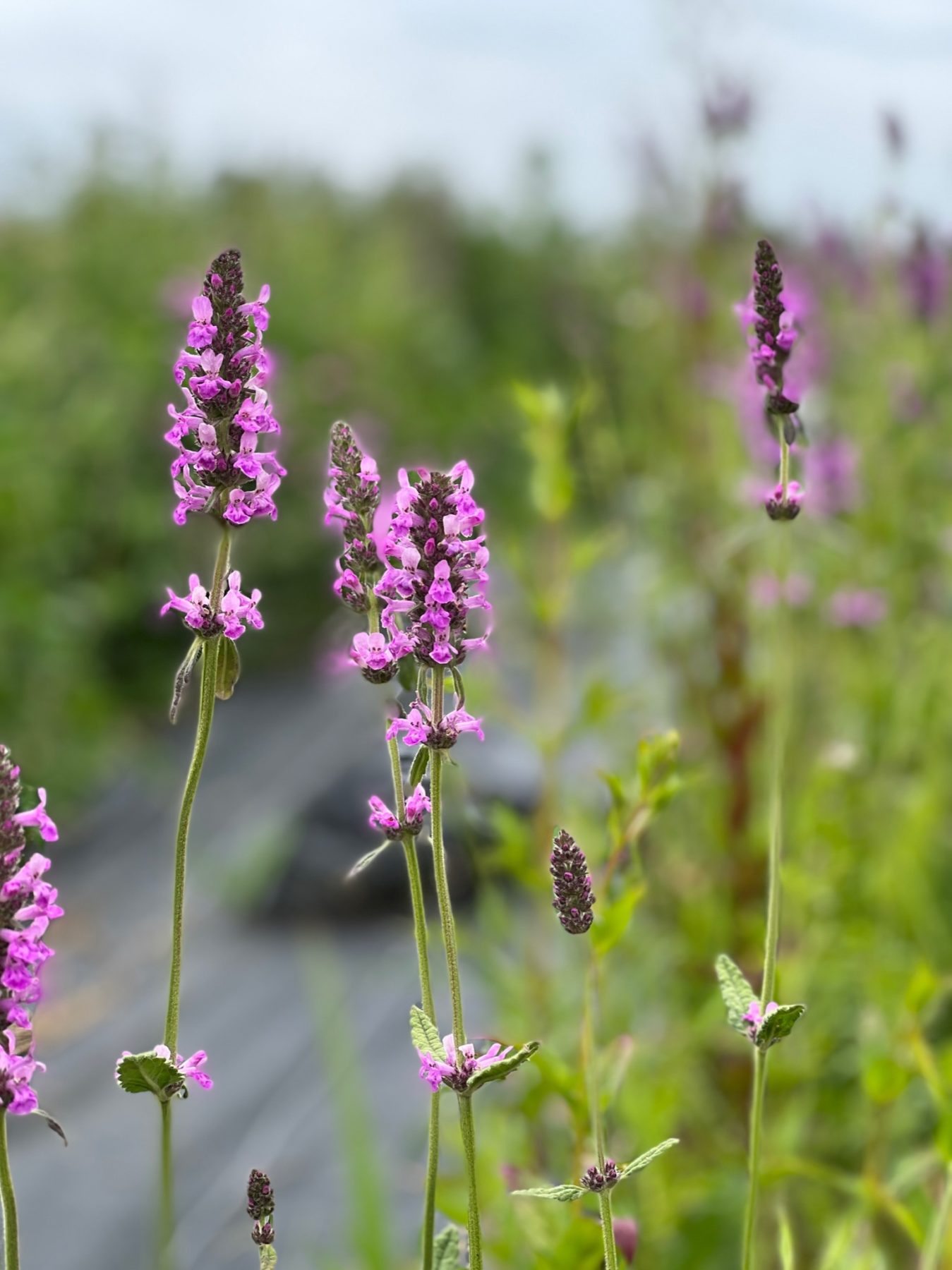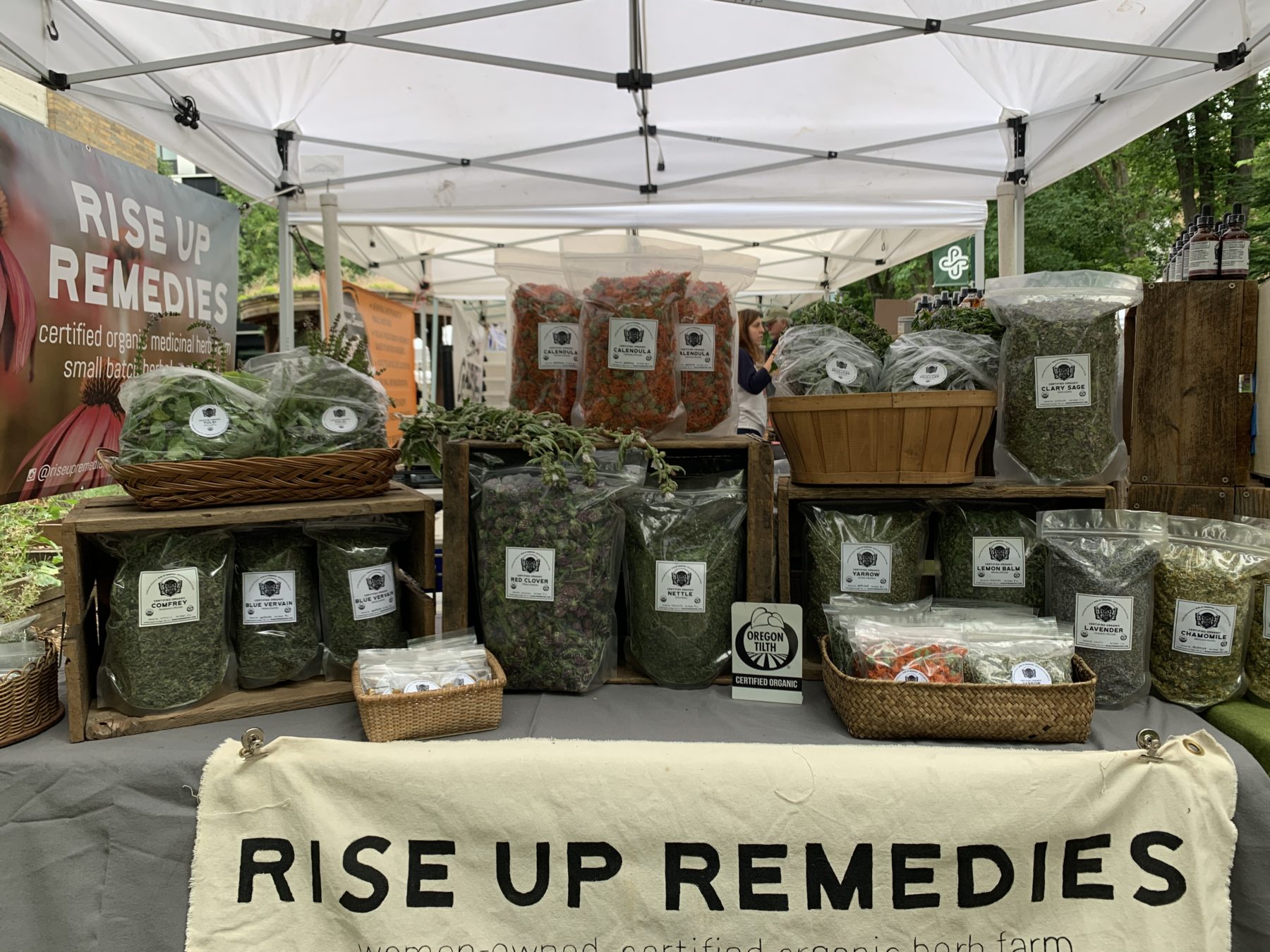Rise Up Remedies: Herb Farming in Suburban Portland

The calendula at Rise Up Remedies farm is an alluring bright orange-yellow. When the flowers unfurl and display their vibrant colors to the world, it is time for harvest. Today, an overcast Oregon summer afternoon, is one of those days.
Laura Kennedy, one of the farm’s co-owners, puts on her headphones and harvesting bags, and starts walking down the rows. She picks every flower in bloom.The process will take her three to four hours to harvest seven beds in full bloom. Laura harvests twice a week while the calendula is blooming, typically from June to October, until the year’s supply of flowers has been obtained.
After harvest, the calendula flowers will go into the dehydrator on-site, where they are dried for storage. The dried calendula is then sold in bulk to herbalists and home DIY-ers or is combined with additional herbs and ingredients to make salves, oils, tea blends, and other products. This cycle is repeated for every one of the 40+ species that are grown on the farm, with each herb requiring different growing, harvesting, and processing protocols.
Rise Up Remedies is a certified organic herb farm and small-batch herbal apothecary based out of the Headwaters Farm Incubator, on the outskirts of Portland, Oregon. The Incubator is a program created by East Multnomah Soil and Water Conservation District to aid “the development of new farm businesses by providing affordable access to land and farm resources”. Headwaters provides land, training, and other resources to farmers that want to start growing, but don’t know how or where to begin. Driving to Headwaters from the urban sprawl of Portland, it is hard to believe that the land is host to such a variety of nascent farm operations – there are diversified veggies and salad farmers, flowers and herbal medicines.

Laura and co-owner Lizzy Simpson founded Rise Up Remedies in 2018. They started the operation because of a mutual interest in herbalism, and because they saw the need for more locally-grown herbs in their Portland community. Laura came to the business with a background in edible landscape design, while Lizzy brought years of experience in vegetable farming. They both had shared interest and experience in herbalism. So Rise Up Remedies was a natural fit, with each partner providing the necessary skills to get the business off the ground.
The first year, understandably, was a slow start. But over time, the business took root and word of their high quality herbs and products started to grow. Fast-forward five years and Rise Up Remedies is now a fixture in the Portland herbal scene. They sell fresh and dried herbs and herbal apothecary products in their online shop, at the Portland State University Farmers market and local independently-made-goods purveyor Tender Loving Empire; they offer local pick-up at a number of venues; and they host regular You-Pick days during the growing season.

Rise Up Remedies has been certified organic with Oregon Tilth almost since their inception. This was important to Laura and Lizzy for one main reason: trust. As a new business without an established customer base, they needed to showcase their commitment to organic practices and producing high-quality medicinals grown naturally and free from pesticides and other chemicals. Having the USDA Organic seal and OTCO logo on display at markets and being able to label their herbs as ‘certified organic’ immediately established a rapport and sense of connection with their community.
Over time, they soon saw another benefit to organic certification – it helped them think differently about their operation and how it fit within the larger ecosystem. Certification made them consider questions like: “who’s farming next to [us]?” “What animals live next to [us] and how are [we] providing habitat for them?” “Are [we] providing for pollinators?”. They knew they were creating habitat for pollinators and other beings in their ecosystem, but organic certification helped them to consider this impact on a deeper level.
Rise Up Remedies’ success can make it appear that it was smooth sailing from the start, but the two have had their share of difficulties over the years. For Rise Up Remedies, the biggest struggle was merely finding knowledge on how to grow organic herbs. Surprisingly, there is a lack of available information on herb farming, and they had to do a lot of self-education. They had to learn first-hand when to harvest their herbs; the best steps for production and processing; and much more.
In addition to available knowledge, they also faced the challenge of labor. Harvesting a single species (calendula, for example) can take many hours over multiple days. They grow 40+ species on the farm, and these plants need constant upkeep over the growing season. After harvest, Laura and Lizzy then dry and process these herbs, and make value-added products like teas, oils, and salves. They then package and sell these products, in addition to all of the standard marketing and administrative tasks associated with running a business. The farm has had occasional help over the years, but for the most part, they do all of this work by themselves.
If you are in the Portland area, consider going to Rise Up Remedies’ You-Pick farm days, or visiting them at the PSU Farmers market. On the farm, you’ll be surrounded by dozens of blooming herbs, and you’ll get the chance to experience the harvest life of an organic herb farmer. If you aren’t nearby, you can still pursue their online store, and try some of their hand-crafted medicinal offerings (Laura’s favorite is the calendula oil).

Rise Up Remedies is now in their last season at Headwaters Farm (the Incubator gives farmers 5 years on the land but then they must go out and find their own way). Their future is uncertain, yet Rise Up Remedies has made deep connections within their community, and hope that they will find their next farm home soon. If the past is any indication, Rise Up Remedies will persevere and find a solution and they will keep producing that beautiful calendula that impressed us so much during our visit.
